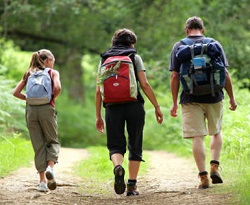Active Lifestyle 
You’re probably tired of hearing that gastrointestinal disorders are very difficult or impossible to treat; however, contrary to the panic and restlessness instilled by a potential diagnosis, you will find such conditions are in fact easy to manage, if not prevent altogether. Many of us tend to underestimate the benefits of an active lifestyle in preventing GIT disorders, and the aim of this article is to prove how simple it is to protect your digestive system by following a few simple, scientifically accurate tips.
What happens in the human body during and after physical activity?
The reward pathway (mesolimbic pathway) in the brain is flooded by two main types of neurotransmitters – monoamines and endorphins. These are commonly known as “feel-good hormones” due to the exhilaration and general feeling of well-being they induce. A similar mechanism takes place when you eat chocolate or cuddle with someone.
Several studies published in The American Journal of Epidemiology have revealed that an active lifestyle reduces the risk of depression and may even help overcome the condition. Moreover, there is a well-established connection between physical activity and metabolism. When your heart rate starts to elevate and muscles begin to fire, your body requires more resources to sustain physical activity, which can only be achieved if nutrients are synthesized at a higher rate. Every biological process is therefore accelerated, including metabolism and cognitive functions that keep you alert (surprisingly, you may notice it is very difficult to fall asleep for a few hours after a workout, which is why most people prefer not to exercise in the evening).
The benefits of exercising in preventing gastrointestinal disorders
Although not all exercises impact your digestive system in the same way, it’s generally fair to say that food takes less time to move through the intestines if you exercise. Have you ever had the urge to go to the bathroom after a good run or a few sit-ups?
Aerobic exercise, for example, stimulates the contraction of the intestinal muscles – the rest is basic, self-explanatory physics. As a consequence, less water is absorbed into the body, which leads to a smoother bowel movement (i.e. prevents constipation) and speeds up the detoxification process.
According to the Gastroenterological Society of Australia, cardio workouts that engage abdominal muscles and strengthen your core also stimulate intestinal muscle contraction. Therefore, practicing a wide range of sports including swimming, tennis and skiing helps you prevent bowel movement disorders. In case of moderate intensity swimming, water “massages” your internal organs and helps relieve the pressure on your gastro-intestinal system.
On the other hand, lighter exercise such as skating or riding a bike prevents heart burn. According to Dr. Barbara Frank, MD, gastroenterologist and clinical professor of medicine at Allegheny University of the Health Sciences MCP-Hahnemann in Philadelphia, more intense exercising (jumping, strength training), especially right after a meal, works against gravity and increases acid reflux.
Do you always have to work out hard to prevent constipation?
Not at all. Always advance through your program in a gradual manner, without pushing yourself too hard. Being organized and active (i.e. anything but inert/sedentary) is more important than difficulty or fast-paced exercises. Basic adjustments like walking home from work every day instead of driving or taking public transport will benefit your digestive system just as much.
Yoga and Tai Chi
The “seated spinal twist” Yoga pose massages abdominal organs, which increases blood flow to the digestive system. Sit down on a yoga mat with your left leg extended in front of you. While using your right foot to press against the floor and catch your balance, bend the right leg and cross it over the left one. Twist your upper body to the right and reach your right knee with your left elbow. Twist as far to the right as you can, take a few deep breaths and switch sides. You must stop the exercise immediately should you feel any pain.
Tai Chi is an ancient Chinese practice known for its beneficial effects against constipation. It engages the spine into slow, circular movements which in turn massage your internal organs and supply more oxygenated blood to your gastro-intestinal system.
Preventing irritable bowel syndrome (IBS) by leading an active lifestyle
Whether you’re genetically predisposed to IBS or are threatened by hectic eating habits, leading a healthy, active lifestyle is sufficient to prevent this chronic disorder. According to a Seattle Pacific University study, women who suffered from IBS were 48% less likely to be active compared to healthy women. In the case of IBS sufferers, it was the majority of inactive women who reported a feeling of incomplete evacuation. Active women with IBS reported a lower level of fatigue and milder symptoms than inactive women, which suggests that physical activity plays an important part in both the prevention and management of this disorder.
While light and moderate exercise could mean the difference between gastro-intestinal disorders and a healthy digestive system, extreme physical effort can be harmful. As several studies reveal, increasing numbers of healthy athletes develop gastro-intestinal disorders due to overtraining. Also keep in mind the best time to exercise is one hour after your meal. If you work out on a full stomach, a significant part of your blood supply will be redirected from the gastro-intestinal tract to your cardiovascular system, leading to discomfort and nausea.

